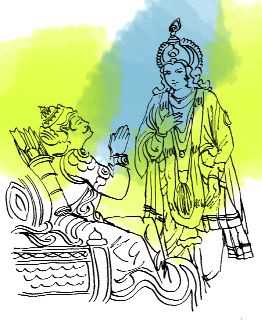Sai R Vaidyanathan
Names of various places have been changed in the recent past. The most recent one has been that of three islands of Andaman and Nicobar Islands on December 30, 2018.
These incidents have generated much debate in the media. In one of his plays, William Shakespeare asks, “What’s in a name?” If one looks at Indian epics, the answer would be “A lot”, as many personalities have got named after their actions.
The scream
Once, the King of Lanka was flying on his Pushpak aircraft on top of the Himalayas. On seeing Mount Kailash, he decided to lift it. The sudden jerk broke the meditation of Lord Shiva atop the mountain.
On realising what was happening, Shiva pressed the mountain down with his big toe. At the base, the fingers of the Lord of Lanka got trapped. In pain, he let out a loud scream. Then, he sang hymns in praise of Shiva. Finally, the Lord relieved him from his painful position and named the Lankan King Ravana — one with a loud scream.
The greatest sacrifice
After conducting the Vishwajit sacrifice, Asura King Mahabali grew very powerful. Soon, he drove away the gods from heaven. Aditi, the mother of the gods, urged Lord Vishnu to intervene. The Lord agreed to be born to her.
In time, Vishnu was born to Aditi as a midget Brahmin boy named Vaaman. On hearing that Mahabali was conducting the Ashwamedha sacrifice, Vaaman decided to visit him.
On seeing Vaaman, Mahabali asked what he sought. “Three paces of land measured by my feet,” Vaaman replied.
“Done,” promised the Asura King.
Vaaman increased his size and covered Earth and heaven in two steps. “Where do I put my third step?” Vaaman asked. “On my head,” said Mahabali. As no sacrifice could be greater than Mahabali’s, the Sanskrit word for sacrifice — balidaan — was named after the great King of Kerala.
Super charioteers
King Dasrath of Kosala was not only an excellent archer but he also handled the chariot very well. So adept was he that on the battlefield, he seemed to be shooting missiles from all 10 directions: north, south, east, west, northeast, northwest, southeast, southwest, up and down. For his extraordinary skills, he was named Dasrath (10 chariots).
The greatest charioteer ever was Lord Krishna in the Mahabharata. When no compromise could be reached between the Pandava and Kaurava cousins over their kingdom, war became inevitable.
So Pandava prince Arjuna and Kaurava prince Duryodhana went to seek Krishna’s help. He said, “As I am equally related to both sides and I can finish off any side in seconds, I will take part in the war unarmed. My massive Yadava army will go to the opposite side. Make your choices.”
While Arjuna chose the unarmed Krishna as his charioteer, Duryodhana gleefully took the Yadava army. As the charioteer (sarathi) of Partha (another name for Arjuna), he gave the motivational message of the Gita and became renowned as Parthasarathi.
Their actions made them big names, their names even bigger.
The author can be contacted at author.sai@gmail.com
FEEDBACK
Standard of care must be uplifted
I read with great interest the articles on “State of Mind” by Dr Simmi Waraich, Aditya Vikram and others. There is a huge stigma attached to persons with mental illness.
The government medical system in India just does not have the capacity to take care of these patients. In urban areas some private practitioners are available, but their number is too less. On top of it, not all can afford a private practitioner.
The government and society at large in India have general apathy to this problem and it seems the last of their priorities. Hence, unless the standard of care similar to the NHS in UK or in the US is developed in India, there is little hope.
There is an urgent need to increase the level of awareness in society to realise the magnitude of the problem and put pressure on the government to set up facilities for mental health. What is also needed is a change in the attitude of people at large.
The series of articles are a step forward in this direction.
Dr Rajesh Kaushash, Head, Plastic Surgery Dept New Najran General Hospital, Saudi Arabia
Concerted efforts can make a difference
The series on mental health issues will help spread awareness in the country. Just 1-2% of the total healthcare budget is spent on mental health in India and the stigma attached makes it even worse.
The onus for the time being lies on the collaboration between psychiatric health workers, psychiatrists, district and state hospitals, local NGOs, and most importantly local and national media in spreading awareness.
The shortage of psychiatric workforce can be made up as per the newer trend of integrating mental health as part of general healthcare hospitals, rather than labelling and building specific mental hospitals.
This series on mental health issues will help spread public awareness and engage and push the government officials and policymakers to do more in this field.
Prof Renu Gupta Department of Radiology, Kuwait University
Unlock Exclusive Insights with The Tribune Premium
Take your experience further with Premium access.
Thought-provoking Opinions, Expert Analysis, In-depth Insights and other Member Only Benefits
Already a Member? Sign In Now











